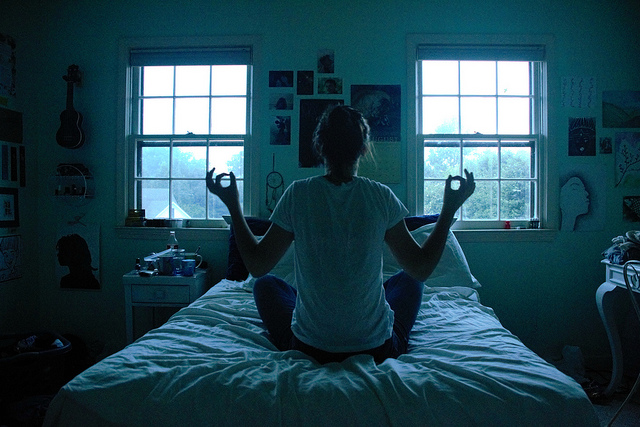Our houses aren’t the only things that get cluttered—our minds do too!
Many of us are emotional hoarders, and have so many feelings stacked up in inside that we can barely move around. If that sounds familiar, then it may be time for some inner housekeeping.
For those of us who are especially emotional, it’s kind of like showing up at home with a new piece of furniture every single day. If we don’t make room, we’re eventually going to run out of space, and it’s going to get uncomfortable.
The more intensely we experience our emotions, the more often we’ll need to clean house.
Now I can go several weeks sometimes without going through this process, but sometimes I have to do it daily.
It just depends on how I’m doing and what’s going on in my life. We have to determine for ourselves what works but doing it occasionally is better than not doing it at all.
Before I outline the steps I use to freshen up my head space, there are a couple of helpful things to keep in mind.
First, consider that just because an emotion feels bad, doesn’t make it bad.
Pain, fear, anger and sadness often are guideposts leading the way to our biggest transformations and most powerful healing!
All emotions have value.
Second, please remember that our emotions cannot hurt us. There have been times I have felt so sad I was sure it would kill me…but it didn’t. So, remember that while our emotions are real, in the sense that there are actual changes happening in our brains, they’re not going to hurt us unless we let them.
Note: If this gets to be too much, and you’re having thoughts about hurting yourself, then please seek professional treatment immediately. If you don’t know where to start call the National Suicide Prevention Lifeline.
By following these 10 steps as many times as we need, we can watch our worlds open up!
It may not happen overnight (although it can), but if we practice inner cleaning we will feel lighter, freer, and learn a lot about ourselves in the process. After all, knowledge is power, and knowing ourselves does empower us!
1. Set up Support
If you’ve never done this before, chances are you’re going to find some things that you hid away a long time ago and you may have hidden them because they were too painful. Uncovering them is a good thing in the long run, because those feelings are either going to keep sitting there collecting dust, and causing problems, or get pulled up into the light and cleared away.
Clearing them is always better, but it’s not always pleasant, so having someone who knows what you’re up to, and is willing to lend an ear will make a big difference. This can be a therapist but it could also be a close friend or family member. Just have someone to call on if it gets to be too much.
2. Set Aside Time
Put your phone on airplane mode, set a timer for at least 30 minutes, and make sure you will not be disturbed. If you have an hour or more, great. Even if you have all day, I still recommend putting a time limit on the session, because when we’re venturing into some dark corners, it helps to know there’s an end to it.
Just keep in mind that you’ll need a few minutes after the timer goes off to wrap things up, so make sure you give yourself some cushion. If you’re concerned about taking time away from your significant other/spouse or kids, please remember that helping yourself helps them. It’s better for everyone to have a happier partner and happier parent!
3. Give Yourself Permission to Have an Intense Experience
It’s okay to cry our eyes out. It’s okay if we shake with fear. It’s okay if we beat the crap out of a pillow. That’s why we set aside some time where we won’t be disturbed—so that we can go clear out what we need to clear out to get to a lighter, freer place! Don’t try to reign it in—we can do that when the timer goes off. Until then, let it out. Really, it’s okay.
4. Meditate
Meditation allows us to get present, which is an essential part of this process. We don’t have to be experts in meditation, we just have to sit quietly and observe our thoughts. Don’t try to change them, just let them come, and watch what comes up. If you start to feel really sad/angry/happy/afraid/amused…just go with it!
Get really angry. Get really sad.
Laugh hysterically.
Don’t try to fight with what’s there, just let it be there.
If it helps you to visualize, picture an actual room filled with clutter. What do you see? Dig around, and look closely at what’s there. Those visual cues can give you access into your subconscious and open a portal for healing old wounds.
5. Write it Out
After meditation for a few minutes (I recommend at least five minutes out of your 30 minute session), pick up a pen and paper and start writing about what you saw. Using a pen and paper is preferable to a computer/tablet/phone simply because our gadgets are more distracting.
Whatever thoughts came up for you in your meditation, write them down.
Please don’t censor. If you’re worried about someone finding it, you can rip it up later–what’s important is that we say whatever there is to be said. It’s also important not to change or fix our thoughts before writing them down. It doesn’t matter if we are writing something we think is horrible. The paper isn’t judging us!
This is where the clearing really happens. We’re taking whatever was in our heads, and dumping it out onto the paper. Once it’s outside, we don’t need to keep it in our head anymore.
6. Check in
Once you feel that you’ve written all there is to write, or you come to a natural stopping place, pause for a moment and check in with yourself.
Do you feel better? Do you feel worse? Are you numb? Are you confused?
Any of those experiences are valid and perfectly acceptable. There’s not a right way to feel. That being said, if you feel better, this may be a good time to complete the process for the day. If you feel worse, or feel like you’re bumping up against something, and you have more time left, repeat steps four and five as many times as you can before your timer goes off.
7. Create a Closing Ritual
It is vital to bring closure to this process, so that we can move on with our day. There isn’t one correct way to do this, so see what calls to you.
You can say a prayer, asking your higher power to hold everything you cleared for safe keeping. You can throw the paper away. You can rip it up. You can make it into art. You can put it in a special notebook. You can even burn it!
There are a lot of options, so choose something that has significance for you, and lets you know your process is done for the day. Feel free to experiment with it. You don’t have to feel 100% cleared out yet, but you do need to demarcate a clear ending to your session.
8. Thank Yourself for the Experience
You’ve just done yourself a huge service! Acknowledge yourself for going through your inner junk and doing what many people aren’t willing to do. It’s no small task.
9. Check in With Your Support Person
You may just want to send them a text letting them know how it went or you may want to call and have a long conversation. The length of the check in is up to you, but it’s a good idea to do this at least the first few times, especially if you’re up against some serious emotions, or if you have been through trauma. I still call my mom after I have an intense clearing session, even though I don’t need to. It never hurts to include the people you love on your journey and sometimes sharing what you got out of it helps them too.
10. Schedule Your Next Session (Optional)
If it helps to do this regularly, or if you feel like you still have some clearing to do, take out your calendar and schedule your next session. Many of us get busy and wait until it becomes a problem before we remember to do it again. If you tend to fall into that category, go ahead and get it on the books!
If you don’t feel clear yet, don’t worry! It took many sessions for me to feel relief at the beginning. I had a lot of old stuff stored in there! Just keep coming back to it. It helps us release so much, and there’s a lot of freedom in that.
There’s nothing we can’t clear with time and practice, so keep practicing.
Relephant:
HEALING FROM THE INSIDE OUT: A PRACTICE IN SELF-LOVE.
~
Author: Iris McAlpin
Apprentice Editor: Jessica Chardoulias / Editor: Renée Picard
Photo: lillie kate/Flickr


 Share on bsky
Share on bsky





Read 2 comments and reply